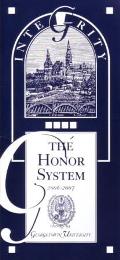III. Standards of Conduct

Without regard to motive, student conduct that is academically dishonest, evidences lack of academic integrity or trustworthiness, or unfairly impinges upon the intellectual rights and privileges of others is prohibited. A non-exhaustive list of prohibited conduct includes:
A. Cheating on Exams and Other Assignments
Cheating is the use or attempted use of unauthorized materials, information, study aids, or unauthorized collaboration on in-class examinations, take-home examinations, or other academic exercises or course deliverables. It is the responsibility of the student to consult with the professor concerning what constitutes permissible collaboration. Cheating or assisting another student to cheat in connection with an examination or assignment is academic fraud.
B. Committing Plagiarism
Plagiarism, in any of its forms, and whether intentional or unintentional, violates standards of academic integrity. Plagiarism is the act of passing off as one’s own the ideas or writings of another (see “What is Plagiarism?“). While different academic disciplines have different modes for attributing credit, all recognize and value the contributions of individuals to the general corpus of knowledge and expertise. Students are responsible for educating themselves as to the proper mode of attributing credit in any course or field. Faculty may use various methods to assess the originality of students’ work. For example, faculty may submit a student’s work to electronic search engines, including Turnitin, a service to which the Honor Council subscribes.
Note that plagiarism can be said to have occurred without any affirmative showing that a student’s use of another’s work was intentional.
Considering now the case of AI-generated intellectual work (including prose text, poetry, computer code, statistical analyses, etc.) the Honor System requires that these be used with the same integrity as other forms of auxiliary resources. Course work, not created by the student, is to be acknowledged as such. While many companies that make available the use of their AI tools do grant ownership of the product to the user, the ownership of such material is not relevant to their course-related purposes. (Consider in this context the parallel case of buying a paper or having a friend write one for you.)
The question of how to acknowledge this work, and whether it is to be allowed at all, is answered by individual course policies. It is, as always, the students’ responsibility to be sure that they are following the rules laid out by their professors. Note that, as with all source material, this applies both to work taken directly from the AI generator and to work that has been paraphrased before being used in coursework. If you didn’t generate the words yourself, say so by quoting and citing the source; if you generated the words but not the content and ideas, say so by citing the source.
C. Contract Cheating
Paying another student or other individual, or otherwise engaging in formal or informal arrangements by which another student, individual, organization or system does one’s coursework violates standards of academic integrity. Contract cheating is considered to be among the most serious forms of academic misconduct because of the obvious intent to deceive. Moreover, advertising to provide or providing such assistance is academic fraud and a violation of the Georgetown Honor System. (Approved by the MCEF on 3/2/2020)
D. Using False Citations
False citation is academic fraud. False citation is the use of an incorrect or fabricated source with the intention to deceive. False attribution seriously undermines the integrity of the academic enterprise by severing a chain of ideas which should be traceable link by link.
E. Submitting Work for Multiple Purposes
Students are not permitted to submit their own work (in identical or similar form) for multiple purposes without the prior and explicit approval of all faculty members to whom the work will be submitted. This includes work first produced in connection with classes at either Georgetown or other institutions attended by the student.
F. Submitting False Data
The submission of false data is academic fraud. False data are data that have been fabricated, altered, or contrived in such a way as to be deliberately misleading.
G. Falsifying Academic Documentation
Any attempt to forge or alter academic documentation (including transcripts, letters of recommendation, certificates of enrollment or good standing, registration forms, and medical certification of absence) concerning oneself or others is academic fraud.
H. Abuse of Library Privileges
All attempts to deprive others of equal access to library materials constitute a violation of academic integrity. This includes the sequestering of library materials for the use of an individual or group; a willful or repeated failure to respond to recall notices; and the removal or attempt to remove library materials from any University library without authorization. Defacing, theft, or destruction of books and articles or other library materials that serves to deprive others of equal access to these materials also constitutes a violation of academic integrity.
I. Abuse of Shared Electronic Media
Malicious actions that deprive others of equal access to shared electronic media used for academic purposes constitute a violation of the Honor System. This includes efforts that result in the damage or sabotage of campus computer systems.
